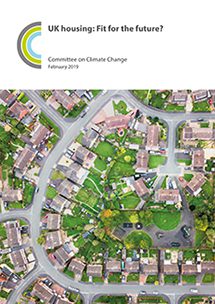
“It is also right that government receives their independent advice on the level of ambition required to meet agreed targets. However, we are concerned about the degree to which the CCC is attempting to dictate future policy. We are also concerned that the scale of these recommendations means that, in some cases, the impact on consumers will be considerable. From both a political and practical perspective this will make them difficult to implement.
“The cover of the report shows homes viewed from a great height and this perhaps unconsciously reflects how the CCC views the problem; from this lofty position it must seem both easy and appropriate to impose the necessary solutions on the people below.
“However, at ground level, the messy reality of the UK’s often poorly insulated housing stock becomes much clearer. For existing homes, the CCC advocates a programme of deep retrofit energy efficiency improvements, combined with a widespread switch to electric heat pumps, paid for by green loans and the Treasury. But ultimately all these measures will be paid for by the public, either through additional taxation, higher energy bills or at the expense of something else. Given the existing enormous pressure on both public and family budgets, it’s difficult to see how this can be achieved.
“A crucial, but often overlooked aspect of heat policy – indeed any successful policy – is public support. While cash-strapped home owners and ‘generation rent’ may welcome green policies in principle, few are likely to be able – let alone willing – to actively embrace them. This is highlighted clearly in BEIS’ public attitudes tracker. It will also be very difficult to convince people to abandon technologies they have already invested in heavily, have trusted over many years, and which work perfectly well. Overall, we think that imposing high capital costs on consumers will be politically challenging unless the decarbonisation policies are shown to be socially fair.
“It is also troubling that the CCC recommends that heat pumps should be deployed in homes off the gas grid during the 2020s, while at the same time acknowledging a shortage of skilled installers. Given that 97% of oil-using homes are in EPC band D-G, and are thus difficult to retrofit, the potential for poor outcomes is obvious unless this issue is adequately addressed.
“The CCC’s new report contains many important and worthwhile proposals, particularly around the need to improve the quality of new homes to avoid the need for costly retrofit at a later stage. However, for existing homes, particularly in the challenging off-grid sector, they continue to fall into the trap of not considering the potential benefits of all low carbon technologies, whether as complete or partial solutions.
“By contrast, we have been pleased to find in our discussions with BEIS, a more pragmatic and open-minded approach and a greater acceptance that a range of low carbon solutions may be more successful in meeting the UK’s diverse needs. BEIS also appears to understand that measures which are low cost, and which impose minimal disruption on consumers, are far more likely to be acceptable – and therefore achievable.”
www.oftec.org.uk/